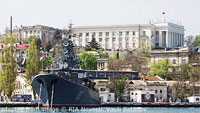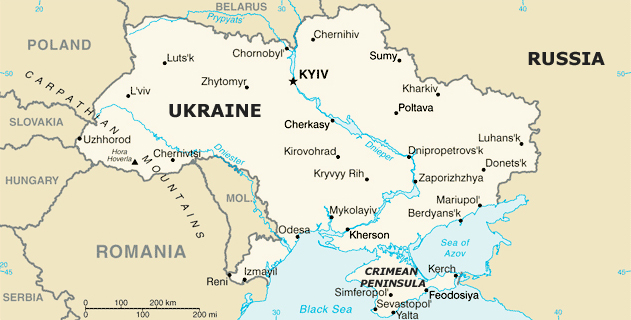re: Crimea

Subject: Crimea
Date: Thu, 20 Mar 2014
From: Sergei Roy <sergeiroy@yandex.ru>
The other day I received a letter from a German friend concerning Ukraine. I could not leave a letter from an old friend unanswered, though I do very little writing these days. My reply expresses rather clearly, though not fully, my take on what goes on there.
Best wishes,
Sergei
[former editor-in-chief Moscow News. More information here http://sergeiroy.com/abouteng.html]
—–
2014 03 19 MM:
Dear Sergei,
we live in interesting times. I don’t want to bother you with politics, but the current events cannot be left uncommented. What we currently see is the downfall of the EU, that is accompanied by everything the West tried to stand for. I am deeply sorry for the German politics, and would like to tell you that it does not reflect the opinion of most Germans. Alas, it seems that the people of the Crimea have more possibilities to choose their destiny than we have.
With sad greetings,
Melchior
—–
2014 03 19 SR:
Dear Melchior,
The other day my wife hit on a hilarious ZDF program, in cabaret style, devoted to the Ukrainian events, and I was happy to hear that at least some Germans understand what’s what and who is who. I hope that most do, whatever Frau Merkel might say. As for the EU, the phrase that instantly comes to mind is what Ms. Nuland said about it in a certain telephone conversation.
You say we live in interesting times; I rather think we live in a topsy-turvy world. The anti-Communist West now fiercely defends what the Communist Khrushchev did to the Crimea in 1954. If you remember, Stalin died in 1953, and there was a power struggle in the Politburo; to the death, you might say. Beria was shot, but there were still guys like Molotov, Malenkov, Voroshilov; they had been closer to Stalin, and thus with a bigger mandate to absolute power. Khrushchev outmaneuvered them. The Ukrainian Communist Party was second in numbers and first in the influence of men from the South on the Central Committee. So K., who came from the South himself, made them a present of the Crimea and gained their support. No one even thought of asking the people of the Crimea for their opinion on the matter.
Of course, nothing of this had any effect on the people on the ground. It was one big country where this sort of administrative-political nonsense did not concern anyone but the nomenklatura, the ruling class. In the ’50s and ’60s, I did a lot of mountaineering, and after climbing all over the Caucasus for a month or so, we used to go down to the Black Sea coast and wander along the Caucasian, Crimean, Odessa beaches, sometimes reaching Moldavia even. The difference was in the scenery and the fact that in the Crimea a glass of homemade wine cost 40 kopecks, while in Moldavia, you could buy it for 20.
It all changed in 1991. Jesus, don’t I remember it. On August 20, an agreement was to be signed on reforming the Soviet Union into a Union of Sovereign States. On the 19th, the tanks rolled in, and I went and spent 72 hours at a barricade by the White House of Russia. On the 22nd, the Communist putsch was over, and on the 24th Ukraine’s Supreme Soviet declared Ukraine’s independence – on account of an uncertain situation in the Center, that is, in Moscow. This was eagerly recognized by the West. Now Crimea declares its independence from Kiev on account of the threat of Nazism coming from Kiev, and the West cries foul. Like Putin says, it’s not even double standards, it’s rank cynicism. And it is cynicism, no other word for it. 96.3 percent of the Crimean people vote for being reunited with their Motherland, the whole peninsula is drunk on wine and joy, and Obama says he won’t recognize it, he will apply sanctions. Well, over here most everybody repeats that Russian saying about scaring a hedgehog with a naked Arsch. That’s the general opinion about those sanctions.
I do wish people would read history books. Ukraine as a state was entirely a Communist invention. Before 1919, it had never existed as a state with definite borders. The Ukrainian name for Ukraine is Ukraina, which in Russian sounds as okraina, meaning literally “edge of an area,” “outlying region.” That was what it was for centuries – the outlying regions of Lithuania (not the present-day Lithuania, but the state which is now Belorussia), of Rzeczpospolita polska, of the Ottoman Empire, of the Austro-Hungarian Empire, of the Russian Empire. In 1919, Lenin handed over to Ukrainian Bolsheviks a huge swath of Russian territory called Novorossia – Kharkov, Kherson, Nikolayev, Odessa. That was a purely ideological, Communist decision: most of Malorossia (which was the former name for the territory where Ukrainians lived) was peasant, therefore petty-bourgeois and a threat to proletarian dictatorship; so those industrial areas were added to Ukraine to sort of dilute the peasantry. In 1925 Stalin added the coal-mining, Russian-speaking Dombass region to Ukraine, on the same ideological grounds. In 1945, he grabbed Western Ukraine, and increased the size of the Ukrainian Soviet Socialist Republic still more.
Present-day Russian Communists never tire of pointing out that Ukraine within its current borders is a totally Communist experiment. The West does not want to hear it. If the Communists did something to weaken Russia, Long live the Communists, says the West. If the Nazis in Kiev are a threat to Russia, Long live the Nazis. And these people call themselves statesmen. You know, there’s another Russian joke that is often repeated these days: a kid once saw his parents making love, and he observed in disgust: And these people forbid me to pick my nose!
Russia keeps repeating its proposals about getting together with European leaders and helping Ukraine overcome its crisis – before it collapses economically and financially and defaults on its national debt. Right at this moment, it owes Russia $1.8 billion for gas alone, and has nothing to pay it with, and is not going to. As ever, it all comes to money. Russia is certainly not going to finance the illegitimate, anti-Semitic, Russophobic, Nazi-dominated Kiev. The only reasonable solution is to recognize the patchwork character of present-day Ukraine, the fact that it’s split down the middle, and the industrial regions will never accept the Nazi-dominated regime in Kiev. Federalization is the only way out for Ukraine. Russia could then deal with the Russian-populated East and South, and the EU (meaning mostly Germany, the way I see it) could provide for Kiev – if it has any money to waste. The EU does not wish to hear of any such proposals, it is absolutely deaf to them, spouting nonsense about sanctions instead. Well, they merely provide material for more of ZDF cabarets. I must tell my wife to look for more of them on YouTube.
Best wishes,
Sergei Roy

